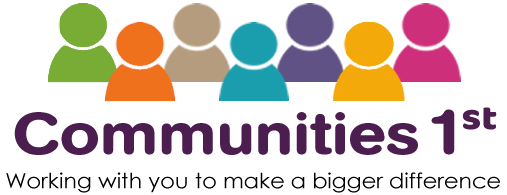Cheryl*, in her sixties, is a volunteer with Communities 1st. She has undertaken two very different roles – collecting and delivering oxygen monitors to vulnerable people and being a telephone befriender. Cheryl’s experience highlights the important part that volunteers can play in being the eyes and ears in the community, being aware of possible concerns, and, as necessary, passing on information.
Cheryl has lived in St Albans for some forty years. She trained as a solicitor and specialised in family law, often representing children in care. She is active in her church and is the parish safeguarding officer. Over a cup of coffee, she described her experience with C1st.
Delivering oxygen monitors... And telephone befriending
“When Covid struck, I worked at home for a week and then, coincidentally, I retired, as I had been planning for some time. I had time on my hands, and wanted to help, and fight the pandemic. I’d read about Communities 1st, and I was quickly signed up as a volunteer.”
“I enjoyed delivering the oxygen monitors,” she explained. “It was very straightforward. I’d get a call from Communities 1st, collect the monitor, and then deliver it to the vulnerable person in the community. Job done!”
We went on to talk about Cheryl’s befriending role. Cheryl telephoned June* regularly, each week, for about a year. Telephone befrienders phone people with a long-term health condition, offering chat, a listening ear, understanding, and information. “I was pleased to phone June, and I think this drew on my skills,” Cheryl explained. “I feel the relationship went well but I soon realised that June was very poorly, in considerable pain, and with some mental health needs. The calls could be quite challenging and to tell the truth at times I felt out of my depth. I felt there could be safeguarding concerns. I would phone Communities 1st for their help and ask them to take action.”
Professional boundaries within a volunteering role
Cheryl was always mindful of the need to act appropriately and within the bounds of the voluntary roles she held. She knew that she was not a health professional and therefore, “tempted as I might be I wouldn’t give advice. If the conversation went a particular way, I might give information or signpost and that seemed okay.”
Cheryl was always pleased with the response that she received from Communities 1st. “They always listened to what I was saying and would take action to make sure that June was safe. They would contact other specialist agencies. I once suggested that June might benefit from having an advocate to help with her health problems. I was pleased to discover that this was set up.”
"I was pleased to help..."
Given the challenges that Cheryl faced, I wondered if she regretted taking on this job. “Not at all,” she told me. “June needed help and support and I hope I was able to make a difference. I like to think that June secured an advocate in part through me. I have no hesitancy in taking up another befriending role.”
I was pleased to enjoy a coffee with Cheryl. Walking home, I reflected that in these blogs we often hear about volunteering that is fairly straightforward and runs smoothly. Much volunteering is like that. Cheryl’s experience shows that while at times volunteering can be challenging, and it is important to seek help and support, it can still be rewarding and very worthwhile. Moreover, volunteers can often hold an important part of the jigsaw that professionals are unaware of. This goes to show just how much volunteers can help be the eyes and ears of our communities.
Postscript
Later, I was able to catch a quick word with Louise, a staff member who continues to work on the C1st befriending service. “We need more volunteers like Cheryl!” she told me. “I first spoke to her when I was new in post and always found Cheryl very helpful. She was diligent, provided context, and always acted promptly.” She continued “In raising her concerns, Cheryl was able to help us to help June more effectively. Together with our volunteers we act as one big team.” This was important to Cheryl who realised that she was never working alone.
(*Not her real name.)
Written by: Chris Cloke, Volunteer
